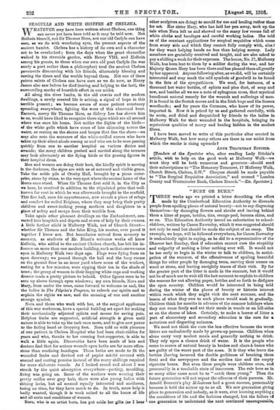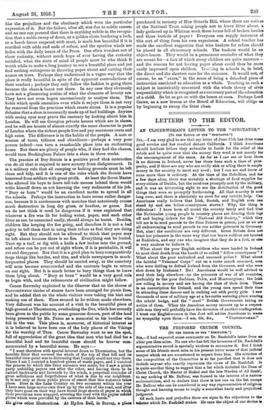"BURY OR BURN."
THREE weeks ago we printed a letter describing the effort made by the Cumberland Education Authority to dissuade people from spoiling places of natural beauty—not to say disgracing themselves—by damaging flowers and shrubs and leaving behind them a litter of paper, bottles, tins, orange-peel, banana skins, and so on. This Education Authority issued an exhortation to school- children, written by Canon P,awnsley, which it was suggested should not only be read but should be made the subject of an essay. The example, we hope, will be followed everywhere, for Canon Rawnsley is undoubtedly right in saying, as he did to a representative of the Observer last Sunday, that if education cannot cure the stupidity and vulgarity of making a litter nothing ever will. It would not be too early to begin in the winter to talk to children, in antici- pation of the summer, of the offensiveness of spoiling beautiful things for other people by damaging trees, carving their names on wood or stone, and leaving unsightly traces of their visit. By far the greater part of the litter is made in the summer, but it would not be of much use to wait till the last moment to explain to children the reasons for not allowing paper, bottles and so forth to disfigure the open country. Children would be interested in being told during the winter of the places of beauty or historic interest within reach which they might visit the next summer, and the lesson of what they owe to such places would soak in gradually. Children think for months in advance of the summer holidays when they can roam freely and eat their meals in woods or on hill-sides or on the shores of lakes. Certainly, to make a horror of litter a part of elementary and secondary education is the cure for a notorious and disgusting nuisance.
We need not think the cure the less effective because the worst litters are undoubtedly made by grown-up persons. Children when alone carry very modest meals and generally nothing to drink. They rely upon a chance drink of water. It is the people who come to scenes of natural beauty in brakes and chars-inbancs who are guilty of the worst part of the mess. It is they who leave the bottles (having incurred the double guiltiness of breaking them first) and the newspapers and the sardine tins and the empty cigarette boxes. But even these people were children once, and presumably in a teachable state of innocence. The rule here as in so many other cases must be to "catch them young." Then the future generation will not repeat the offences of their parents. Mr. Arnold Bennett's play Milestones had a great success, presumably because it held the mirror up to us all. We saw generation giving place to generation and nobody, as it were, ever learning anything; the conditions of life and the fashions changed, but the failure of one generation to understand the next continued unconquerable,
like the prejudices and the obstinacy which were the particular expression of it. But the failure, after all, was due to subtle causes, and no one can pretend that there is anything subtle in the recogni- tion that a noble sweep of down, or a golden shore bordering a loch, or a beech forest carpeted with mast, is made less beautiful if it is scarified with odds and ends of refuse, and the sportive winds are laden with the daily issues of the Press. One often wonders out of sheer curiosity, without much hope of ever having the curiosity satisfied, what the state of mind of people must be who think it worth while to make a long journey to see a beautiful place and yet find nothing outrageous in throwing paper about and cutting their names on trees. Perhaps they understand in a vague way that the place is really beautiful in spite of the apparent contradictions of their conduct ; perhaps they only follow the fashion in going there because the chars-k-banes run there. In any case they obviously have not a glimmering notion of what the elements of beauty are- They have not even begun unconsciously to analyse them. The habit which spoils amenities even while it enjoys them is not very far removed from the practices which create slums. It is a popular delusion that a slum is necessarily made up of bad buildings. Anyone
with seeing eyes may prove the contrary by looking about him in
London. He will see Georgian private houses which are in slum', and he will see houses of almost exactly the same character in parts of London where the richest people live and pay enormous rents and high rates. The difference is in the habits of the people. A man or woman of taste, tidiness and cleanliness—perhaps a very poor person indeed—can turn a ramshackle place into an enchanting home. But there are plenty of people who, if they had the chance, would turn Buckingham Palace into a slum in three weeks.
The practice of Boy Scouts is a positive proof that instruction can do all that is required to save scenery from disfigurement. It is a military rule that all camping or halting grounds must be left clean and tidy, and it is one of the rules which the Scouts have borrowed from soldiers with great profit. At least the Scout Master who allowed his boys to leave tell-tale messes behind them would write himself down as not knowing the very rudiments of his fob. "Bury or burn" would be an excellent motto to spread in all the schools. Perhaps the instruction to burn seems rather danger- ous, because it is carelessness with matches that notoriously causes much destruction in long dry grass, or heather, or gorse. But we do not think it need be dangerous if it were explained that wherever a fire was lit for boiling water, paper, and am& other litter as can be consumed easily, should always be burnt. Besides, children like keeping the fire going, and therefore it is not a bad policy to tell them that in using their refuse as fuel they are doing right. But they should not be allowed to think that paper may be left about because there is no fire. Everything can be buried. Turn up a turf, or dig with a knife a few inches into the ground, and refuse can be put out of sight where, if it is perishable, it will rot and disappear. Not that it is a good plan to bury comparatively large things like bottles, and tins, and whole newspapers in much- frequented places. They should be carried away, or the cemetery will soon become overcrowded and the contents begin to return on our sight. But it is much better to bury things than to leave them lying about. "Bury or burn" would be a very good rule to begin with, and the refinements of civilization might follow.
Canon Rawnsley explained in the Observer that on the shores of Derwentwater circles of stones have been arranged for picnic fires, and he added that on the whole visitors were taking the hint and making use of them. Fires seemed to be seldom made elsewhere. Very different was his account of a visit to the beautiful piece of high ground at Thurstaston, overlooking the Dee, which has recently been given to the public by some generous donors, part of the land being presented by Mr. Paton as a memorial to his brother who fell in the war. This place is, moreover, of historical interest as it is believed to have been one of the holy places of the Vikings for the worship of Thor. Canon Rawnsley went to see the spot, full of appreciation of the great idea that men who had died for a beautiful land and its beautiful cause should be forever com- memorated by a beautiful scene. He says :—
" I went therefore with special interest down to Thurstaston, but the horrible litter that covered the whole of the top of that hill and its beautiful view-point was so distressing that I simply could not stay there. Where I sat I counted a hundred pieces of waste paper, and I watched the process by which this litter nuisance was made, for I saw a picnic party unfolding papers one after the other, and leaving them to be carried backwards and forwards by the winds, a perpetual reminder of gross selfishness and forgetfulness of what is duo to our neighbour. It is not only at these public places of resort that this nuisance takes place. Here in the Lake Country on two occasions within the year I have seen large motor-cars draw up by the side of the road, and after they have gone on their way have found large sheets of paper in whfoll their provisions were wrapped, strewing the road with the papier mUh plates which were provided by the caterers of their lunch."
He gives other illustrations. At H,ydon Ball. 112 Blirrnire a Place purchased in memory of Miss Octavia Hill, where there are notices of the National Trust asking people not to leave litter about, a lady gathered up in Whitsun week three boxes full of broken bottles and three bushels of paper I Everyone can supply instances of this sort of thing from his own experience. A school teacher has made the excellent suggestion that wire baskets for refuse should be placed in all elementary schools. The baskets would be an object-lesson. They would be a permanent reminder of what they are meant for—a fact of which many children are quite unaware— and the reasons for not leaving paper about could thus be more easily impressed upon children. TeaCaing in schools is, in brief, the direct and the shortest cure for the nuisance. It would not, of course, be an "extra," in the sense of being a detached piece of instruction unrelated to education as a whole. Teaching in such a subject is inextricably concerned with the whole theory of civie responsibility which is recognized as a necessary part of the edueation of a child. So let us get on with the lesson at once. Perhaps Lord Crewe, as a new broom at the Board of Education, will oblige us by beginning to sweep the litter clean.



























 Previous page
Previous page